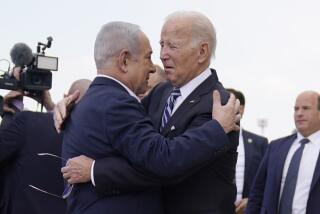Two States, One Holy Land: a Solution With Precedent
- Share via
The common wisdom in response to the unrest in the West Bank and Gaza is that the Israelis have only unattractive alternatives to their present policy: They might grant equal rights to all in a democratic, non-sectarian state--which would no longer be distinctively Jewish--or remove the territories’ 1 1/2 million Palestinians, by persuasion or expulsion--but to what other country? Or they could impose still harsher conditions on their Arab subjects--and provoke an outright war.
This sort of reasoning is based on the assumption that the profound attachment of both Israelis and Palestinians to the same small piece of real estate makes unavoidable a zero-sum game, in which any development advantageous to one side must be disadvantageous to the other.
It need not be so. One can envision a society in which, by severing political and voting rights from economic and social rights in a negotiated settlement, both the legitimate national aspirations of Palestinians and the legitimate security interests of Israelis could be simultaneously satisfied.
The non-negotiable minimum for both peoples of the Holy Land is their own self-determination as peoples and nations--that they can have a state of their own in the land that both consider sacred, and that never again will anyone else govern them.
This is not impossible. The Holy Land could be a single economic and social unit encompassing two sovereign states and one Holy City. Jerusalem could form an undivided part of both states, be the capital of both states and be governed by an autonomous, elected municipal council.
All current residents of the Holy Land could be given the choice of Israeli or Palestinian nationality, thus determining which state’s elections they would vote in and which state’s passport they would carry. Each state could have its own “law of return,” conferring citizenship on persons not currently resident in the Holy Land.
Borders would have to be drawn on maps but would not have to exist on the ground. The free, non-discriminatory movement of people and products within the Holy Land could be a fundamental principle subject only to one major exception: To ensure that each state would always maintain its national character, the right of residence in each Holy Land state could be limited to that state’s citizens, to citizens of the other Holy Land state residing there on an agreed future date, and to their descendants.
Jerusalem’s status poses the toughest problem for any settlement plan. The United Nations’ 1947 partition plan envisioned the city as a separate entity with international status, yet the concept of joint sovereignty is not without precedent. Chandigarh is the undivided capital of two Indian states. The western sectors of Berlin, under American, British and French sovereignty, are jointly governed by an autonomous senate. For more than 70 years, Vanuatu (formerly the New Hebrides) was under the joint sovereignty of Britain and France.
As a joint capital, Jerusalem could have Israeli government offices in its western sector, Palestinian government offices in its eastern sector and municipal offices in both. Undivided, it could be a city of hope and peace for Jews, Muslims, Christians and the world as a whole.
As an essential counterpart to the absence of border controls within the Holy Land, Israel could retain the right to participate in immigration controls at the frontier of the Palestinian state. Restricted visitors found in Israel could face severe penalties.
To ease Israeli security concerns, the Palestinian state could be demilitarized, with only local police forces and United Nations peace forces allowed to bear arms.
The settlement agreement could be guaranteed by the United Nations and relevant states, with international tribunals set up to arbitrate disputes regarding compliance with its terms.
For Israelis, the threat of one day living in a state with a majority of Arab voters would be replaced by the assurance of living in a state with fewer Arab voters than today. The Israelis’ security would be enhanced by assuaging, rather than continuing to aggravate, the Palestinians’ grievances.
For all Palestinians, human dignity would be restored. For those in exile, an internationally accepted Palestinian nationality, a Palestinian passport and a right to return, if only to visit, would have enormous significance.
If the Palestinians themselves accepted a settlement, few Arab states would continue to reject Israel. If a Palestinian flag were peacefully raised over Palestinian government offices in Jerusalem, few Arab eyes would still see Israel through a veil of hatred.
Israelis and Arabs both should realize by now that peace can be negotiated only with one’s enemy, not with one’s friends. Israel will hold an election this year, and if the Labor Party will not put teeth in its wishful talk of peace--if it will not offer, if elected, to negotiate a peace with the Palestine Liberation Organization--some other party should come forward and do so.
If a new Israeli government offered to negotiate on such a basis and the PLO refused, the PLO would forfeit much of its support, both internationally and within the occupied territories, and risk becoming irrelevant. If the PLO offered to negotiate on such a basis and a new Israeli government refused, Israel would forfeit much of its international support and risk serious internal disruptions, even among its Jewish citizens.
The current collision of Israeli and Palestinian anger and anxiety begs for a bold break with the old assumptions. With vision and commitment, a Holy Land of peaceful coexistence and mutual respect can be made such a strong possibility that any alternative would be not just unattractive; it would be unthinkable. The opportunity is there. May someone who counts have the courage to seize it.
More to Read
Sign up for Essential California
The most important California stories and recommendations in your inbox every morning.
You may occasionally receive promotional content from the Los Angeles Times.













